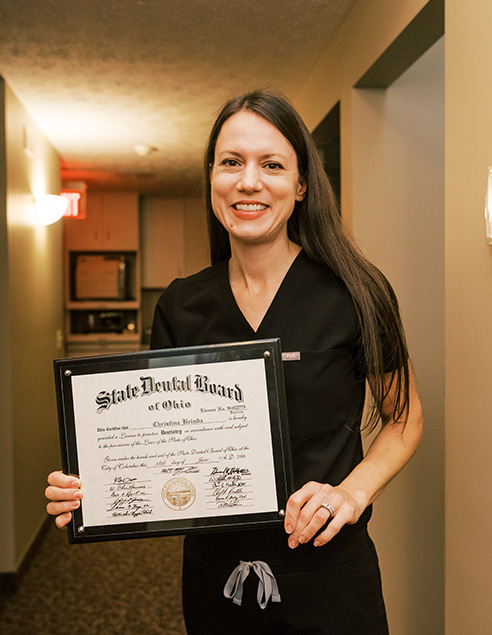If you’re a new denture wearer or even if you’ve had dentures for a while, you might notice some changes in your saliva production. It’s a common experience, and understanding the relationship between dentures and saliva is key to your comfort and oral health. At Christina Brinda in North Canton, we believe in providing our patients with complete information. Find a dentist who specializes in dentures near you just like Dr. Christina Brinda in Jackson Township, Ohio. With this blog, Dr. Christina Brinda will explain how dentures can affect your saliva and what you can do about it.
How Dentures Can Affect Saliva Production
Your body’s salivary glands are highly responsive. Therefore the introduction of a foreign object like a denture can trigger various reactions. Below we have classified some of these reactions that we consider more prevalent.
Increased Saliva (Initial Stage)
When you first get new dentures, your mouth might perceive them as food or an irritant. This can lead to your salivary glands going into overdrive. The salivary glands will then producing more saliva than usual. While this can feel awkward it is a completely normal response and usually subsides as your mouth adapts to the dentures.
Decreased Saliva (Dry Mouth)
Conversely, some people experience a reduction in saliva flow which leads to a dry mouth. This can be caused by various factors:
- certain medications
- medical conditions
- simply not drinking enough water.
A dry mouth can make dentures feel uncomfortable, cause them to slip and increase the risk of oral irritation and infections.
Changes in Saliva Quality
Sometimes, it is not just the quantity but the quality of saliva that changes. Saliva helps naturally cleanse your mouth. However, if saliva is thicker and less effective, it can impact denture retention and oral hygiene.
Why Saliva is So Important for Denture Wearers
Saliva plays a crucial role in oral health and denture comfort. Below we will explore some ways saliva helps with your denture to feel normal.
Natural Adhesion: Saliva helps create a natural seal between your dentures and your gums. This natural seal aids with retention and stability.
Lubrication: Saliva, lubricates your mouth making your dentures feel more comfortable. Saliva also reduces friction against your gums.
Cleaning: Saliva naturally washes away food particles and bacteria which helps to keep your mouth and dentures clean.
Taste and Digestion: Saliva is essential for taste perception and the initial stages of food digestion.
Tips for Managing Saliva Changes
If you’re experiencing issues with saliva production due to your dentures, below you will find some tips from your dentist for dentures.
Stay Hydrated: Drink plenty of water throughout the day. This is the simplest and most effective way to combat dry mouth.
Practice Good Denture Hygiene: Regularly cleaning your dentures and your mouth helps prevent bad breath and the sticky feeling associated with dry mouth.
Chew Sugar Free Gum or Mints: These can stimulate saliva production if you’re experiencing a dry mouth. Be sure that the gum or mints you use are sugar-free to protect any remaining natural teeth.
Use Saliva Substitutes: Over the counter artificial saliva products or oral rinses can provide relief for chronic dry mouth.
Avoid Irritants: Limit caffeine, alcohol and tobacco, as these can contribute to dry mouth.

Consult Your North Canton Denture Specialist
If you’re struggling with excessive saliva, persistent dry mouth, or any discomfort related to your dentures and saliva, don’t hesitate to reach out to us. At Christina Brinda DDS, we are a dentist who specialize in dentures and are here to help you find solutions for optimal comfort and oral health. We’re here to ensure your denture experience is as comfortable and healthy as possible.
📞 Call our North Canton office today at (330) 498-0668 to schedule an appointment.

Ryan F.

Daniella S.
General Dentist Brinda is the best dentist I ever been to . If you’ve been holding off going to the dentist, whether for just cleaning or getting wisdom teeth out , go here . The staff is so welcoming and friendly and Dr. Brinda is so knowledgeable and walked me through every procedure from start to finish and all the expectations. She is a perfectionist that wants you to look your best and goes out of her way to do just that . I went in for a whitening treatment and cleaning and it was the best experience that I had at a dental practice! I definitely recommend this place to anyone looking to feel comfortable,well cared for and informed, while receiving best treatment for their smile.

Sorin B.
Dr. Brinda is hands down the best dentist I’ve ever been to! My wife and I live in Michigan and we make the drive every year to go see her because she’s that good! Whether it’s going in for cleaning/whitening or taking care of a cavity, I always have a great experience going here. I’ve never really enjoyed going to the doctor for anything, but I can honestly say I enjoy coming here for my yearly checkups. Dr. Brinda is very knowledgeable and extremely professional, and she goes out of her way to make people feel welcome and cared for. Highly highly recommend!

Ronald V.

Karen M.

David J.

Dan E.

Ms Lux
Dr. Brinda and her amazing office team are lovely; down to earth and outstandingly competent. Their main focus, I have no doubt from all of my visits, is their patient’s oral health. This team is professional and efficient, but also what we all want in a medical team of any sort, very knowledgeable. I truly appreciate all of the care and concern this office has offered me. This is truly a top notch team and one you can thoroughly entrust with your dental health. Thank you to you all.

Ty H.

Ty H.

Nathan C.

Angela P.

Leah K.

Sonya S.

Max P.

Jessica L.

Liv M.

Scott J.

Katherine G.

Calle S.

Beth S.

Tierra M.

Amy R.

Barbara F.

Katie M.

Myah W.

George M.

Barbara F.

Madison S.
I personally was shadowing Dr. Brinda's office for my Dental Hygienist Program, and it was an amazing experience! Dr.Brinda and her wonderful team are constantly working to make sure things are sterilized, wiped down, and organized for your visit! There was nobody sitting around, but everyone was helping other people out! Staff at Dr. Brinda's office was respectful, sweet and supportive! Dr. Brinda personally took time with patients, and treated them like a person, not just a patient. She asked recurring patients about an update on their personal lives from the patients last visit, and it was amazing to see the patients smile when she remembered. Overall, from someone who saw behind the scenes of this office, I would gladly come there to visit just to see the amazing work they do. I highly recommend Dr. Brinda's Office!

Rana Q.

Amy R.

Beth S.

Devin K.

Monica L.

Donald W.

Angela D.

Sebastian K.

Zara W.

Caleb M.

Amy S.

Matt W.

Chris L.

Efrain A.
My oldest started at 1 1/2 - 2 years old and now is 16. All are very happy with Dr. Brinda as well as the staff. Very caring and always explain what is going on when performing dental work beyond basic cleanings. Great attention to detail.

Susan R.
Dr. Brinda is friendly, caring and knowledgeable as are the staff. The atmosphere makes you feel at ease for any dental procedure.
Thanks to Dr. Brinda and all the staff.

Leah K.

Mark P.
I normally don’t make recommendations or write testimonials for services rendered. I expect and demand the highest patient care for my hard earned buck, period. I have been a patient for several years. Her team of professionals are exceeding my expectations regarding knowledge, kindness, skills, patient care, and my well being. Beginning from the initial phone call to schedule an appointment, through all of the facets of dental care provided, and processing the insurance payment, each employee earns a five star on my every visit.

Lauren S.
The most friendly staff I have ever seen in a dentist office! Dr Brinda was super knowledgeable about some underlying health conditions and my pregnancy and was super through and cautious! Say bye bye to any anxiety from dentistry work at this office it’s feels welcoming and homey and very clean.





